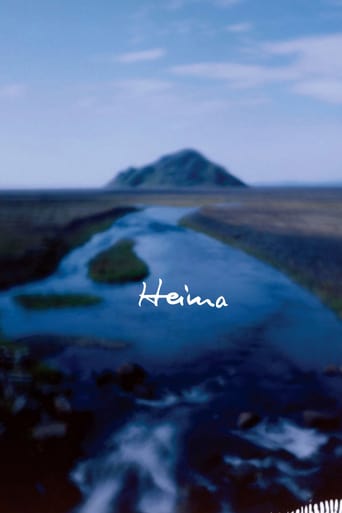Heima (2007)
Ethereal post-rock pioneers Sigur Rós play a string of impromptu gigs in their native Iceland after finishing a world tour in 2006. As they travel through the country, the band visits a wide variety of venues, from a large outdoor festival to a coffee shop.
Watch Trailer
Cast
Reviews
Simply Perfect
A Masterpiece!
It's funny watching the elements come together in this complicated scam. On one hand, the set-up isn't quite as complex as it seems, but there's an easy sense of fun in every exchange.
There are moments in this movie where the great movie it could've been peek out... They're fleeting, here, but they're worth savoring, and they happen often enough to make it worth your while.
From the director of "Lilo and Stitch" comes one of the most beautiful music documentaries? I Watched it completely on accident and was totally entranced. Each of the dozen or so performances are done in rural areas, caves, rundown barns, abandoned buildings, coffee shops, a protest at the building of a damn, and only at the end on an actual stage.Sigur Ros had just released their fourth album and finished a world tour when they decided to play a series of free shows across Iceland, largely unannounced until the day of the show.In the performance at the damn the band decided to play acoustic (since using a generator would be kinda hypocritical while protesting an electric damn) and the wind picks up at the beginning hissing against the cameras without PA to drown out the white noise. But as the song progresses the wind stops and the sounds soar. Spontaneous moments like this or when a dog wanders up walking between the performers, give each song and venue an unpredictable truly "live" feeling. A performance in an abandoned building with only the lead singer on guitar and four of the band's string players seem to echo in the dilapidated building.The name of the film translates to "At Home", and this is very much a poem to the bands native country and the beauty of it's landscapes both natural and urban. The settings are often of faded places being consumed by nature and time, in a minimalist nature porn that would Andy Goldsworthy proud. Although in the case of the damn, the area of the performance is latter submerged under water, as the urban "blight" consumes the landscape. This visual motif runs through the film, but the performances are far from somber, as the audiences attracted to the shows are a both young and old, music fan and curious onlooker, and whole families. The distance created by the obscure imagery is closed in the same moments by the warm focus placed on the regular people attending the shows. The band also performs with a Icelandic poet, and again with a man who creates a kind of marimba music out of different kind of stones using volcanic rocks, flaky stones form cliff slides, and river rocks to produce different tones.An Icelandic choir chants beneath a green hill, and we can hear the connection between these chants and the bands general sound (similarities even the band didn't seem to be aware of until filming). Though they have a lead vocalist and voice is very important to their music...how do I say this without it sounding like a gimmick, oh well...the band have no lyrics as such, and sing in a made up glossia language, making melodic sounds that suit the music. As wiki explains it, "Vonlenska is a non-literal language, without fixed syntax, and differs from constructed languages that can be used for communication. It focuses entirely on the sounds of language; lacking grammar, meaning, and even distinct words. Instead, it consists of emotive syllables and phonemes; in effect, Vonlenska uses the melodic and rhythmic elements of singing without the conceptual content of language. In this way, it is similar to the use of scat singing in vocal jazz.The band's website describes it as "a form of gibberish vocals that fits to the music". Most of the syllable strings sung by Jnr Birgisson are repeated many times throughout each song, and in the case of ( ), throughout the whole album." You can pretend it's just a foreign language if that makes you feel better though. Because there are no words, their music has a blankness and openness to it that gives the listener the ability to project their own thoughts and emotions, without disconnecting from the most immediate instrument that so much instrumental "post rock" can miss; the human voice. Their music is melancholy, grand, triumphant, and intimate at different times, but I wont waste too many words trying to describe it. Words like ambient, glacial, falsetto are used allot in such descriptions, and would be appropriate.The band is interviewed in between songs, and they are humble and unpretentious. Certain sounds are beautiful and just feel "right", no more, no less. They like playing for people who wouldn't normally see them, and are genuinely pleased that each town greets the shows so warmly. The phrase "this is nice" is used several times by several different members, but you know what? It is nice. The combinations of sounds, places, and people create a rhythm that "just feels right". Home is where the...etc. I just watched this and while it was still fresh I wanted to recommend it to just about everyone. I'm not a big fan of documentaries about bands in general, so this was a very pleasant surprise. Like listening to the band's recorded music (which I am biased about since I am a fan of the band who are largely responsible for my love of "The Life Aquatic" and apologist view of "Vanilla Sky") this left me with warm fuzzy feelings.The 90's modern attempts at Woodstock ended in orgies of over-priced water and sexual assaults, so it's nice to see a band somewhere in the world could create free music in intimate venues, that people could appreciate and get behind. Almost everyone appreciated it anyway.One of the bands grandmothers attended a show, but said it was too loud, and when she found out it was on TV, decided to go home and watch it there.When the concert strobey light and video effects came on in the final climatic moments, she thought her TV was messed up and turned it off. You can't please everyone.
Heima is Bliss! I have no words to describe the beauty of this movie. Compelling landscapes and music straight from heaven.There was a singer named as "Tansen" in the "Akbar the great's" era whose singing could light lamps and cause rain. Jón Þór Birgisson is no doubt the reincarnated form of Tansen.I was totally spellbound by the music and the nature and the simplicity of the band members.Its a movie that will make you feel so peaceful and happy from the inside. A masterpiece in which Nature and Music speak for each other.10/10
The Icelandic band Sigur Ros craft otherworldly songs with lyrics drifting between their native tongue and an invented language called 'Hopelandic.' I have long found their music to be both distinctive and enjoyable but continue to harbour some unresolved feelings about the band. I find their music to be rather less subtle than post-rock contemporaries such as Mogwai and Labradford and cannot help but regard their invented lyrical language with a degree of cynicism. Being an admirer of the band but not exactly their greatest fan, I approached Heima, their feature-length film, with a little trepidation. However, I regard the film as a triumph.'Heima' is an Icelandic word for 'home' and this film is accordingly as much about Iceland as the Sigur Rose, who must surely have surpassed Bjork as their country's most famous musical export. I have myself visited Iceland to view its stunning scenery but was nevertheless left breathless by some of the cinematography in this film. The beautiful landscapes of Iceland serve as the backdrop for many of the band's songs, whilst further footage of desolate lava fields, picturesque villages and mammoth glaciers is interspersed between the performances recorded in live venues and the interviews conducted with individual band-members.Sigur Ros choose some remarkable locations in which to play their music. The band illuminate obscure corners of Iceland, most remarkably when they stage a live performance in a disused factory in an abandoned fishing town. The interviews with the band feature some frank and sometimes-humorous recollections and I found it fascinating to watch the way that Icelandic people reacted to the music being performed.The songs of Sigur Ros and the footage of Iceland combine to make this a film that is much more than a straightforward performance video. This is instead a powerful evocation of Iceland through the eyes and ears of the band. For anyone with a passing interest in Sigur Ros or in Iceland this film will be compelling viewing.
Being a fan of Sigur Rós for a while now, I was incredibly excited for 'Heima.' I didn't know what to expect of it, except that it would be moving, passionate, and that I would love it. It certainly turned out that way. They've succeeded in creating an honest and simple documentary that gave me more respect for them, if that is possible.This film rotates around a love of music and of Home: Iceland; a simpler place than a lot of us are used to. Sigur Rós tour their home giving free concerts as a way of giving back to the land and people for what they gave them: a place of inspiration and love. They visit the most remote villages, all the way to the largest city in Iceland, Reykjavík, where it looks as if the whole country shows up for the concert.In between songs, concerts, and interviews (The quartet Amiina also participates in the interviews), there are clips of the country and towns of Iceland. You'll see its mountains, its towns, its fish factories, and its beautiful landscape, which, in my opinion, appropriately fits the music of Sigur Rós.There isn't too much wasted interview time, rather much of the film is spent on the crowds; their faces and their reaction to the music. My only complaint is that some of my favorite songs weren't played. Still, they couldn't have fit everything into it. There isn't a song by them I don't like, and that's a rare thing from one band. Thank you, Sigur Rós, for allowing the world to have a glimpse of yours.





